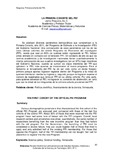| dc.rights.license | http://creativecommons.org/licenses/by-nc-sa/3.0/ve/ | |
| dc.contributor.author | Requena, Jaime | |
| dc.date.accessioned | 2011-06-29T21:00:36Z | |
| dc.date.available | 2011-06-29T21:00:36Z | |
| dc.date.issued | 2011-06-29T21:00:36Z | |
| dc.identifier.issn | 2244-7008 | es_VE |
| dc.identifier.uri | http://www.saber.ula.ve/handle/123456789/33430 | |
| dc.description.abstract | Se analizan diversos parámetros demográficos que caracterizan a la
Primera Cohorte, año 2011, del Programa de Estimulo a la Investigación (PEI)
del Gobierno Nacional. Una comparación de esos parámetros con los de las
cinco últimas cohortes del extinto Programa de Promoción del Investigador
(PPI), revela que casi un 60% de quienes están ingresando al PEI, habían
antes entrado en contacto con el fenecido PPI. Un corolario de ello es que los
centros académicos y de investigación nacionales tienen cuantitativamente la
misma composición de sus cuadros investigativos (en un 97%) bajo incentivos
del Gobierno Nacional, cuando se suman los viejos miembros del PPI que
aplicaron al PEI, más quienes se incorporaron al nuevo programa. Para el
Gobierno el lanzamiento del PEI ha de ser visto como un doble fracaso;
primero porque apenas lograron registrar dentro del Programa a la mitad de
quienes intentaron tramitar su ingreso y, segundo porque no lograron superar el
número de registrados que tenía el PPI en su última cohorte. Por otra parte, para quienes adversan al PEI, no lograron su cometido de abstención, en tanto que casi la mitad de los integrantes de la primera cohorte provienen del PPI. | es_VE |
| dc.language.iso | es | es_VE |
| dc.rights | info:eu-repo/semantics/openAccess | |
| dc.subject | Política científica | es_VE |
| dc.subject | Financiamiento de la ciencia | es_VE |
| dc.subject | Venezuela | es_VE |
| dc.title | La primera cohorte del PEI | es_VE |
| dc.title.alternative | The first cohort of the official PEI program | es_VE |
| dc.type | info:eu-repo/semantics/article | |
| dc.description.abstract1 | Various demographics parameters that characterized the first cohort of the
official PEI Program are analyzed and compared with those of the last five
cohorts of the extinct PPI. About 60% of those that were received into the PEI
program have had some form of liaison with the PPI program. Overall, local research centers and universities now show, quantitatively, the same number of
researchers benefiting from the new incentive program than they had before
with the old program. For the Government, the launching of PEI must be considered a double failure; they just could register half of those that tried to apply and only admitted half of the existing PPI membership. For those that oppose the Program, half of the PPI membership did not bought their call for abstention to register into the new Program. | es_VE |
| dc.description.colacion | 41-53 | es_VE |
| dc.description.email | jaimerequena@cantv.net | es_VE |
| dc.description.frecuencia | semestral | es_VE |
| dc.identifier.depositolegal | PPI200302ME3529 | es_VE |
| dc.subject.keywords | Science policy | es_VE |
| dc.subject.keywords | Science funding | es_VE |
| dc.subject.keywords | Venezuela | es_VE |
| dc.subject.publicacionelectronica | Revista Bitácora-e | es_VE |
| dc.subject.seccion | Revista Bitácora-e: Artículos | es_VE |
| dc.subject.thematiccategory | Artes y Humanidades | es_VE |
| dc.subject.tipo | Revistas | es_VE |
| dc.type.media | Texto | es_VE |


